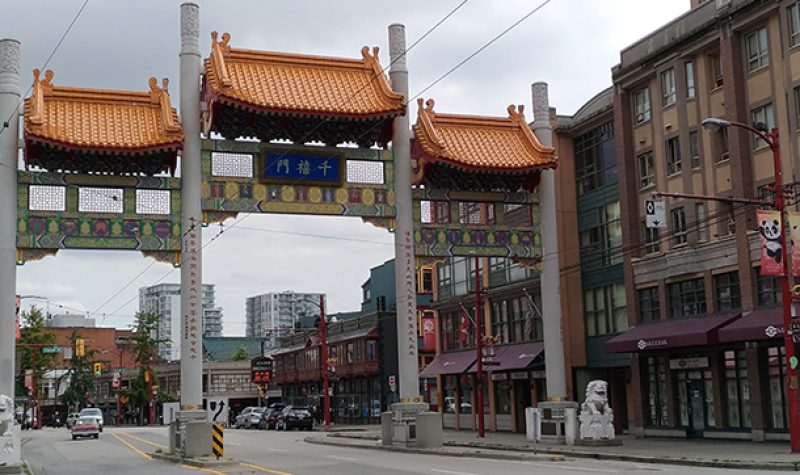By Aly Laube
---
Michael Tan, a Co-Chair of the Vancouver Chinatown Legacy Stewardship Group, sees how the community there has been facing unique barriers since the pandemic began. Chinatown’s vacancy rates have skyrocketed, extremely high in comparison to other parts of the city, and businesses there took a major hit when tourism stopped flowing with the border closure. Less foot traffic means less money being spent at stores, and over the past year, places started shutting down.
Many of the small business owners couldn’t access Canada Emergency Commercial Rent Assistance without the help of their unwilling landlords, so several beloved shops had to close. The Emergency Wage Subsidy Program wasn’t accessible to mom and pop shops with no staff either, leaving them without information or resources for support. Anti-Asian crime also rose enormously, with the marble lions at the gate being defaced multiple times and people being attacked on the street.
Tan says it’s important to celebrate how the community has been able to come together during this time, but that doesn’t negate the fact that they’re grieving community hubs.
“One of the bigger restaurants that closed was Gold Stone Bakery, and that was an institution in the neighbourhood. As an affordable eatery, it was a place for people of multiple generations to hang out. You could go have lunch with your grandparents and have tea, but not anymore,” says Tan.
“It definitely had a role in them shuttering, and it was heartbreaking for the community.”
The $17 million emergency bail program for Granville Island from the government should have been replicated for Chinatown, he says.
“Compare that directly with Chinatown and not having a single cent, and that $17 million was entirely separate from any other emergency funding, so they essentially singled out the neighbourhood to be bailed out versus Chinatown not receiving a dime,” he says.
Although the pandemic exacerbated pre-existing issues such as racism, gentrification, and displacement, the community there has gotten even tighter, partially through online programming.
“There are new programs to promote delivery for people to visit the restaurants in the area and the small businesses,” says Tan.
“The Chinatown Cares Grocery project [by Hua Foundation and Yarrow Intergenerational] … delivers culturally appropriate grocery boxes to seniors in the neighbourhood to help them not go out to the grocery store and increase the risk of exposure to COVID over the last year. They fundraised online from the community and also got support from Vancity, and have been delivering those every week.”
With the Chau Luen Society and BC Housing, they’ve delivered over 25,000 hot, culturally appropriate meals to seniors in Chinatown.
Collaborating with Chinatown Today and Hua Foundation, he also helped put on a Lunar New Year celebration that drew upwards of 500 attendees from around the world.
“We decided, you know what? If no one’s going to do it, we need to do something,” says Tan. “We did a line dance celebration, a kung fu demonstration, singing songs, and lessons. It was just a showcase of this community coming together in a very short amount of time to put on something to help Chinatown.”
There are about 2,000 units of low-income housing specifically for seniors in Chinatown, between SROs and other independent living barriers. One of Tan’s passions is helping them overcome language, technology, and mobility barriers that have grown more problematic since the start of the pandemic.
“When we talk about the vaccination process, it’s that lack of mobility that makes it hard for them to get vaccinated and registered … to even get into different neighbourhoods,” says Tan.
“They announced where the closest clinic was, Athlete’s Village, which is geographically in line of sight. It’s within two kilometres. That’s about two bus rides, but the thing is, when you’re talking about these seniors that have difficulty navigating the bus system, it’s not a direct bus ride. Once you’re there, you’re in an entirely new neighbourhood and have no idea where you’re going. It might as well be on the moon.”
Phone-in instructions for registering for vaccination are only available in English. Agents only speak English, and it’s only once users have successfully been connected to this agent that they can request a translation. At that point, they would patch in someone who could speak that language.
That’s already an often insurmountable barrier for many Chinese seniors, says Tan.
“Really early it was like, ‘Well, why don’t you just make that system immediately multi-language? You could make the recording language appropriate right up front and save a lot of these seniors a lot of time,” he says.
He and his peers have been trying to get Vancouver Coastal Health to vaccinate seniors in Chinatown by going building-to-building or setting up outside. They believe this is totally feasible for VCH and reached out three weeks ago, but haven’t heard anything past initial contact.
“We appreciate how difficult this challenge is, providing vaccinations on a massive scale. I really do, but we still have responsibility to raise awareness that these vulnerable populations are being overlooked,” says Tan.
“I was just visiting, and a senior saw me and said hi. She’s like, ‘Oh, what’s going on with the vaccinations? I knew she had grandchildren who could get vaccinated, and she looked me in the eyes and said, ‘No, we’re relying on you to bring them here to get vaccinated.’ It’s just so frustrating to see that.”
It’s the moments of community that keep Tan going in moments like that.
“My heart is uplifted when so many people care so deeply about the neighbourhood. It’s a fabric,” he says.


